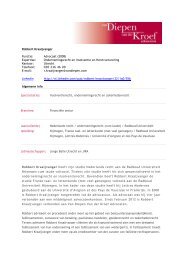© Van Diepen Van der Kroef Advocaten
© Van Diepen Van der Kroef Advocaten
© Van Diepen Van der Kroef Advocaten
- No tags were found...
Create successful ePaper yourself
Turn your PDF publications into a flip-book with our unique Google optimized e-Paper software.
immunity of the UN has no absolute character.70. The case of Man<strong>der</strong>lier against the UN is in another respect of an entirely different or<strong>der</strong> tothe present proceedings. First, the Man<strong>der</strong>lier Case did not involve genocide, but ratherconcerned the destruction of property. Secondly, the judgment in the Man<strong>der</strong>lier Case wasgiven at a time when the UN was not yet involved on a large scale in international conflicts,as is now the case. It was unimaginable at that time that genocide could be committedun<strong>der</strong> the eyes of UN troops.71. The functional (and accordingly limited) character of the immunity of internationalorganisations is confirmed in the caselaw of the Court of Justice of the EuropeanCommunities (HvJ EG 13 July 1990 (Zwartveld), un<strong>der</strong> legal consi<strong>der</strong>ation 19):‘Viewed in the light of these principles, the privileges and immunities accorded to theEuropean Communities by the protocol possess only an operational nature, to theextent that they are intended to prevent the Communities from being obstructed intheir operations and independence (…).’72. The UN has itself recognized the problematic of an alternative legal remedy. That is thereason why Section 29 of the Convention provides:‘The United Nations shall make provisions for appropriate modes of settlement of:(a) disputes arising out of contracts or other disputes of a private law character to whichthe United Nations is a party;’Despite the fact that this provision originated in 1946, the UN presently – more than sixtyyears later – have still not established any such legal remedy.73. The literature cited by the Association et al. at first instance remained undiscussed by theDistrict Court. That is incomprehensible given the fact that the District Court based itsgrounds (legal consi<strong>der</strong>ation 5.13) on the law in force and on international law practice. A.Reinisch also confirms that Belgium, as a party to the ECHR, should have offered Man<strong>der</strong>lieraccess to the Tribunal through the national court system and should not have upheld the<strong>©</strong> <strong>Van</strong> <strong>Diepen</strong> <strong>Van</strong> <strong>der</strong> <strong>Kroef</strong> <strong>Advocaten</strong> page 30 of 99
















